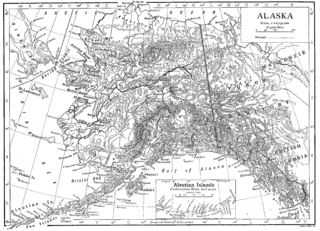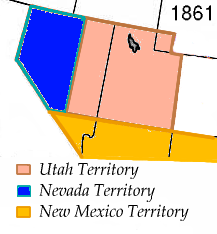
1914 United States House of Representatives elections were elections for the United States House of Representatives to elect members to serve in the 64th United States Congress. They were held for the most part on November 3, 1914, while Maine held theirs on September 14. They were held in the middle of President Woodrow Wilson's first term.
The 1906 United States House of Representatives elections were held for the most part on November 6, 1906, with Oregon, Maine, and Vermont holding theirs early in either June or September. They occurred in the middle of President Theodore Roosevelt's second term. Elections were held for 386 seats of the United States House of Representatives, representing 45 states, to serve in the 60th United States Congress.

The 1904 United States House of Representatives elections were held for the most part on November 8, 1904, with Oregon, Maine, and Vermont holding theirs early in either June or September. They coincided with the election to a full term of President Theodore Roosevelt. Elections were held for 386 seats of the United States House of Representatives, representing 45 states, to serve in the 59th United States Congress.
The 1902 United States House of Representatives elections were held for the most part on November 4, 1902, with Oregon, Maine, and Vermont holding theirs early in either June or September. They occurred in the middle of President Theodore Roosevelt's first term, about a year after the assassination of William McKinley in September 1901. Elections were held for 386 seats of the United States House of Representatives, representing 45 states, to serve in the 58th United States Congress.

The 1896 United States House of Representatives elections were held for the most part on November 3, 1896, with Oregon, Maine, and Vermont holding theirs early in either June or September. They coincided with the election of President William McKinley. Elections were held for 357 seats of the United States House of Representatives, representing 45 states, to serve in the 55th United States Congress. The size of the House increased by one seat after Utah gained statehood on January 4, 1896. Special elections were also held throughout the year.

The 1872–73 United States House of Representatives elections were held on various dates in various states between June 4, 1872, and April 7, 1873. Each state set its own date for its elections to the House of Representatives before the first session of the 43rd United States Congress convened on December 1, 1873. They coincided with the re-election of United States President Ulysses S. Grant. The congressional reapportionment based on the 1870 United States census increased the number of House seats to 292.

The 1868–69 United States House of Representatives elections were held on various dates in various states between June 1, 1868, and August 2, 1869. Each state set its own date for its elections to the House of Representatives before or after the first session of the 41st United States Congress convened on March 4, 1869. They coincided with the 1868 United States presidential election, which was won by Ulysses S. Grant. Elections were held for all 243 seats, representing 37 states. All of the former Confederate states were represented in Congress for the first time since they seceded from the Union.

The 1860–61 United States House of Representatives elections were held on various dates in various states between August 6, 1860, and October 24, 1861, before or after the first session of the 37th United States Congress convened on July 4, 1861. The number of House seats initially increased to 239 when California was apportioned an extra one, but these elections were affected by the outbreak of the American Civil War and resulted in over 56 vacancies.
The 1850–51 United States House of Representatives elections were held on various dates in various states between August 5, 1850, and November 4, 1851. Each state set its own date for its elections to the House of Representatives before the first session of the 32nd United States Congress convened on December 1, 1851. Elections were held for all 233 seats, representing 31 states.
The 1848–49 United States House of Representatives elections were held on various dates in various states between August 1848 and November 1849. Each state set its own date for its elections to the House of Representatives before the first session of the 31st United States Congress convened on December 3, 1849. The new state of Wisconsin elected its first representatives, and California also held its first congressional elections before officially achieving statehood in 1850, increasing the size of the House to 233 seats.

The 1846–47 United States House of Representatives elections were held on various dates in various states between August 2, 1846, and November 2, 1847. Each state set its own date for its elections to the House of Representatives. 228 elected members representing 29 states took their seats when the first session of the 30th United States Congress convened December 6, 1847. The new states of Iowa and Texas elected their first representatives during this election cycle. These elections were held during President James K. Polk's term.

Alaska Territory's at-large congressional district was a congressional district created in 1906 to represent the District of Alaska, which was reorganized into the Alaska Territory in 1912. After Alaska's admission to the Union as the 49th state by act of Congress on January 3, 1959, this district evolved into Alaska's at-large congressional district.

Hawaii Territory's at-large congressional district was the congressional district for the Territory of Hawaii, which was established by the Newlands Resolution of 1898.
Wisconsin Territory had a non-voting delegate to the United States House of Representatives.

Iowa Territory's at-large congressional district is an obsolete congressional district that encompassed the area of the Iowa Territory, which was split off from the Wisconsin Territory in 1838. After Iowa's admission to the Union as the 29th state by act of Congress on December 28, 1846, this district was dissolved and replaced by Iowa's at-large congressional district.

Idaho Territory's at-large congressional district is an obsolete congressional district that encompassed the area of the Idaho Territory, which was originally created from parts of the Washington Territory and Dakota Territory in 1863. In 1864, parts of the territory were ceded back to the Dakota Territory and another part was reorganized into the Montana Territory. The boundaries of the territory were changed again in 1868 when the Wyoming Territory was created.

New Mexico Territory's at-large congressional district is an obsolete congressional district representing the New Mexico Territory, which was created in 1850. After New Mexico's admission to the Union as the 47th state by act of Congress on January 6, 1912, this district was dissolved and replaced by New Mexico's at-large congressional district.

Wyoming Territory's at-large congressional district is an obsolete congressional district that encompassed the area of the Wyoming Territory. After Wyoming's admission to the Union as the 44th state by act of Congress on July 10, 1890, this district was dissolved and replaced by Wyoming's at-large congressional district.

Nevada Territory's at-large congressional district is an obsolete congressional district that encompassed the area of the Nevada Territory, which was split off from the Utah Territory in 1861. After Nevada's admission to the Union as the 36th state by act of Congress on October 31, 1864, this district was dissolved and replaced by Nevada's at-large congressional district.

The 1870–71 United States House of Representatives elections were held on various dates in various states between June 6, 1870, and October 6, 1871. Each state set its own date for its elections to the House of Representatives before or after the first session of the 42nd United States Congress convened on March 4, 1871. They occurred in the middle of President Ulysses S. Grant's first term. Elections were held for all 243 seats, representing 37 states.


















